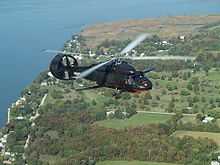Piasecki Aircraft Corporation (PiAC) was founded by American vertical flight pioneer Frank Piasecki to develop compound helicopters and other advanced rotorcraft after he was ousted from the leadership of his first company, Piasecki Helicopter which was renamed Vertol Corporation and later acquired by Boeing.[1]
History

Piasecki VZ-8 Airgeep

X-49A Speedhawk VTDP Technology Demonstrator in flight
The company's origins dated back to 1936 with the formation of the P-V Engineering Forum in 1940 and it was renamed the Piasecki Helicopter Corporation in 1946. After a falling out with other owners, Frank Piasecki and some of his design team left to form Piasecki Aircraft Corporation in 1955. Piasecki Helicopter Corporation eventually became Vertol Aircraft Corporation (bought by Boeing to form Boeing Vertol and now called Boeing IDS Rotorcraft Division).
In 2005, the company was selected as prime contractor for two United States Army FCS UAV systems. The FCS Class III UAV system contract was awarded to the company in late 2006 following a competitive downselect of four competing technologies. As part of that effort, the company flew the world's first autonomous autogyro.[citation needed] The company has been developing and flight-testing the X-49 experimental compound helicopter since the mid-2000s.
Products
- Piasecki 16H-1 World's first shaft driven compound helicopter - 1962
- Piasecki 16H-1A Modified 16H-1 to attain speed over 200 mph (322 km/h) - 1965[citation needed]
- Piasecki 16H-3 Study of next generation of compound helicopter
- PA-59K/VZ-8P First successful Flying Geep 1958
- PA-59N "Seageep" 1961
- PA-59H Airgeep II 1962
- PA-39 Multiple helicopter heavy lift system 1980s (Only design studies. Never went into production)[2][3]
- Piasecki PA-97 Helistat heavy vertical airlifter 1986[citation needed]
- Piasecki X-49
See also
References
- Trimble, William F. High Frontier: A History of Aeronautics in Pennsylvania. Pittsburgh, Pennsylvania: University of Pittsburgh Press, 1982. ISBN 978-0-82295-340-1.
External links
|
|---|
| | Piasecki/Vertol helicopters | |
|---|
| | Piasecki Aircraft | |
|---|
|
|
|---|
| | General | |
|---|
| | Military | |
|---|
| | Accidents/incidents | |
|---|
| | Records | |
|---|
|

